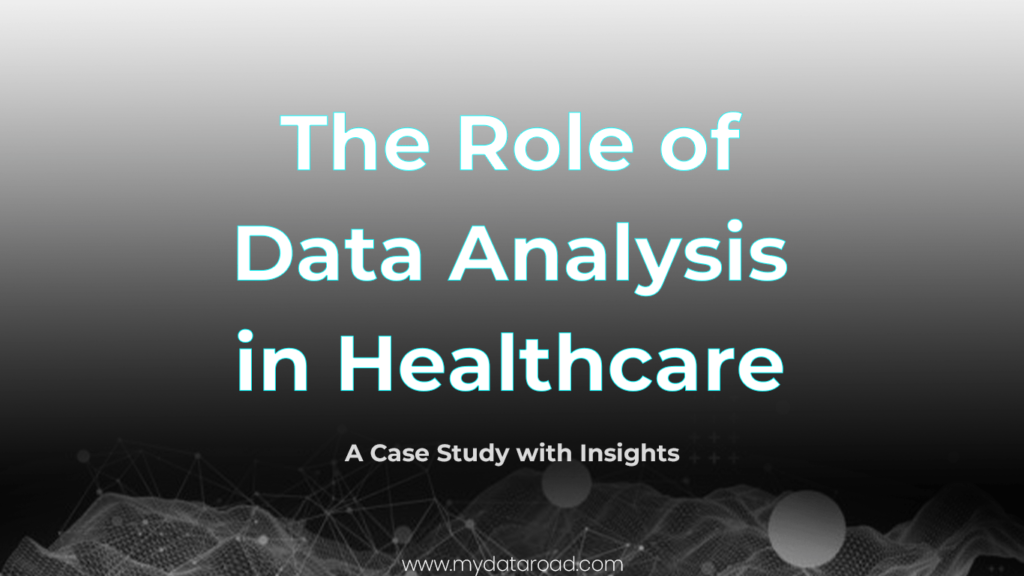The Role of Data Analysis in Healthcare: A Case Study with Insights
In the rapidly evolving world of healthcare, leveraging technology and data analytics has become increasingly important for informed decision-making and improved patient outcomes. Data analysis plays a crucial role in identifying trends, patterns, and insights that can enhance various aspects of healthcare delivery, from diagnosis to treatment and even administrative tasks.
With the rise of value-based care, healthcare professionals are harnessing the power of data to optimize their processes, track population health trends, and ensure better, more efficient care for their patients. One of the key drivers behind this shift has been the growing accessibility and sophistication of data analysis techniques, which are enabling healthcare providers to derive actionable insights from vast amounts of both structured and unstructured data.
This case study will explore these topics in detail, highlighting the transformative potential of data analysis in the healthcare sector. By examining real-world applications and success stories, we aim to shed light on how data-driven approaches are revolutionizing patient care and transforming the industry as a whole.
Evolution of Data Analytics in Healthcare
The evolution of data analytics in healthcare is a testament to the power of technology and its potential to revolutionize the industry. With substantial advancements in the last decade, data analytics has transformed the way healthcare professionals diagnose, treat, and manage patient care.
One of the driving forces behind this transformation is the advent of big data in healthcare. The term “big data” refers to vast amounts of structured and unstructured data generated across various sources like electronic health records (EHR), medical imaging, wearable devices, and more.
The sheer volume and variety of these data sets has necessitated the development of sophisticated tools and techniques to manage, analyze, and derive insights from them. Thus, big data analytics emerged as a crucial component in the field of health informatics.
Big data analytics allows healthcare professionals to analyze data from thousands of patients, identify patterns, and uncover correlations between disparate datasets. This detailed analysis helps medical professionals make more accurate diagnoses, tailor personalized treatments, and enhance the overall efficiency of healthcare systems.
For instance, by identifying patterns in EHR and correlating them with patient outcomes, medical practitioners can make informed decisions on patient care and improve health outcomes.
Health informatics, a subfield of healthcare that combines computer science, information science, and healthcare, is focused on efficiently managing and analyzing healthcare data. With the increasing adoption of EHR systems, the need for health informatics specialists has grown significantly. These professionals play a crucial role in ensuring that healthcare data is securely stored, accurately analyzed, and effectively used to improve patient care.
As technology continues to advance, so does the potential for data analytics in healthcare. With initiatives like the Internet of Things (IoT) and Artificial Intelligence (AI), the healthcare sector is increasingly moving towards a more connected, intelligent, and data-driven ecosystem. By harnessing the power of data analytics in combination with these emerging technologies, healthcare professionals can enhance the quality of care, reduce costs, and ultimately, save lives.
Through the integration of big data analytics, health informatics, and electronic health records, the future of data analytics in healthcare holds immense promise for improving individual and population health outcomes. The ongoing evolution of data analytics in this sector will continue to drive innovations and shape the future of healthcare for years to come.
Role of Data Analytics in Healthcare Decision-Making
Improving Accuracy and Precision
Data analytics plays a vital role in enhancing the accuracy and precision of medical decision-making. By leveraging advanced techniques such as machine learning, healthcare professionals can process and analyze large quantities of structured and unstructured data. This enables them to make well-informed decisions by identifying patterns and trends that might not be apparent otherwise.
Incorporating data analytics into the decision-making process allows healthcare providers to utilize evidence-based interventions. One example where data analysis has improved accuracy and precision is in the management of diabetes. By analyzing patient data, doctors can better understand factors contributing to diabetes and design personalized treatment plans that help better manage the condition.
Enhancing Patient Diagnosis and Treatment
The use of data analytics in healthcare can significantly improve the diagnosis and treatment of patients. With the assistance of data-driven insights, medical professionals can identify potential health issues early, implement preventive measures, and tailor treatments to each individual’s needs.
For instance, machine learning algorithms can be employed to analyze large datasets from health records, genetic information, and other sources. This wealth of information can aid in the early detection of diseases or conditions, potentially leading to faster and more effective treatment options.
Furthermore, data analytics can streamline internal operations, making it easier for healthcare providers to share information and enhancing communication for clinical decision-making. This not only leads to improved patient outcomes, but can also contribute to reducing costs and complexities associated with patient care.
Data Analytics and Patient Care
Data analytics plays a crucial role in modern healthcare, allowing for the improvement of patient care through personalized treatments and effective tracking and monitoring of patient health. This case study examines the impact of data analysis on the healthcare industry.
Personalized Treatment Approaches
By leveraging data from various sources like electronic health records (EHRs), medical imaging, and genomic sequencing, healthcare providers can develop more personalized and targeted treatment plans for their patients. For instance, the analysis of a patient’s genetic profile may reveal specific biological markers that indicate a predisposition to certain diseases, leading to tailored interventions and preventive measures. Furthermore, the integration of bioinformatics into healthcare facilitates the analysis of this complex data, enabling a deeper understanding of individual patients’ unique biology.
Analyzing biometric data gathered from wearable sensors and other devices allows for the continuous monitoring of vital health indicators, such as heart rate, blood pressure, and body temperature. By continuously tracking these parameters, healthcare providers can promptly identify any deviations from the patient’s normal baseline values, allowing for timely intervention and improved patient health outcomes.
Tracking and Monitoring Patient Health
The use of data analytics in healthcare extends beyond personalized treatments, as it enables healthcare professionals to effectively track and monitor their patients’ health. Advanced data analysis techniques are employed to identify patterns and trends in patient health, leading to better disease monitoring and management.
For instance, data gathered through remote monitoring tools, such as wearable sensors, can alert healthcare providers to changes in a patient’s health status, enabling the early detection of potential health issues. Additionally, by incorporating bioinformatics into the analysis of patient health data, healthcare providers can discover new insights into disease progression and treatment efficacy, ultimately leading to improved patient care.
Practical Applications of Healthcare Data Analytics
Mental Health
Healthcare data analytics plays a vital role in addressing mental health issues. By examining large datasets of patient information, it becomes possible to identify patterns and trends in mental health disorders. For instance, machine learning and data mining techniques can be employed to analyze health records, enabling healthcare professionals to make more accurate diagnoses and provide tailored treatment plans for patients suffering from mental health conditions, such as depression or anxiety Data Analytics in Healthcare: A Tertiary Study.
Cardiology
Cardiology is another area where data analytics has a significant impact. Through the analysis of health data, including electronic health records and medical imaging, researchers can develop improved diagnostic and treatment strategies for cardiovascular diseases. Some specific applications include the identification of risks factors, prevention methodologies, and predicting patient outcomes. As a result, data-driven approaches contribute to enhancing the overall effectiveness of cardiology care and reducing mortality rates related to heart diseases Big data analytics in healthcare: a systematic literature review.
Oncology
Oncology, the study and treatment of cancer, has greatly benefited from healthcare data analytics. The utilization of big data in oncological research allows for the exploration of genetic data, the identification of potential biomarkers, and the development of personalized treatment plans. In addition, data analytics can aid in predicting patient responses to specific treatments, improving clinical decision-making, and identifying trends in cancer incidence and survival rates. Consequently, the integration of data analytics in oncology contributes to a better understanding of cancer and the development of more effective, targeted therapies The Role of Data Analytics in Health Care.
Challenges and Opportunities in Healthcare Data Analytics
Addressing Data Privacy Concerns
One of the primary challenges in healthcare data analytics is addressing concerns related to data privacy. With the increasing use of electronic health records (EHRs) and databases storing sensitive patient information, the risks of data breaches and unauthorized access have become significant. Data privacy concerns also extend to the sharing of patient data among healthcare providers, researchers, and other stakeholders. To mitigate these concerns, secure data encryption and regulatory compliance with evolving privacy laws are crucial to protecting patient confidentiality.
Leveraging Artificial Intelligence and Machine Learning
The opportunities presented by artificial intelligence (AI) and machine learning (ML) technologies can significantly improve healthcare data analysis by automating tasks and providing insights tailored to individual patient needs.
These technologies can support clinical decision-making, facilitate the development of personalized treatment plans, and identify patterns in patient data that might not be evident through traditional analysis methods. Implementing AI and ML technologies in healthcare data analytics can lead to improved patient outcomes and more efficient healthcare systems.
Interoperability Issues
Healthcare data often comes from various sources, such as EHRs, medical imaging, and laboratory results, which may use different formats and standards. This lack of interoperability makes it difficult to integrate and analyze data from multiple sources, limiting the potential of data analytics to provide a comprehensive view of patient health. Overcoming interoperability challenges requires the development of standardized data formats and collaboration between healthcare providers, technology vendors, and other stakeholders to ensure seamless data exchange and promote optimal utilization of healthcare data analytics.
The Impact of Data Analytics on Healthcare System Management
Data analytics has significantly influenced the management of healthcare systems, leading to numerous improvements in various aspects. One key advancement is the enhancement of patient care. By utilizing health data analytics, healthcare providers can make more informed decisions, leading to faster and more accurate diagnoses, personalized treatments, and preventive measures.
In terms of healthcare management, data analytics helps lower costs and streamline internal operations. By identifying patterns, inefficiencies, and potential areas for cost reduction, healthcare systems are able to optimize their resources and provide better care at lower costs.
The utilization of big data in healthcare also promotes more informed decision-making at various levels within management. Large quantities of fragmented, structured, and unstructured data can be processed, managed, analyzed, and assimilated using data science techniques. As a result, administrators can make fact-based decisions, improve planning, and ultimately enhance the overall healthcare system’s performance.
Data analytics has shown promise not just in treatment but also in the overall health management. The introduction of Big Data Analytics (BDA) in healthcare makes the use of new technologies possible for both patient treatment and health management aspects. This allows healthcare systems to adapt to the changing landscape, creating opportunities to improve efficiencies and establish innovative patient care practices.
In summary, the impact of data analytics on healthcare system management is multifaceted, touching on various aspects of healthcare such as patient care, costs, and decision-making processes. The use of data-driven techniques empowers healthcare administrators to create efficient, effective, and personalized systems aimed at providing the best care possible for their patients.
The Case Study I: Healthcare System in Metropolitan Hospital

The case study under examination focuses on a healthcare system in Metropolitan Hospital, New York City, spanning from January to December 2022. The subjects involved include patients diagnosed with Type 2 diabetes, along with the medical professionals and data scientists who collaborated in the care management.
The Problem and Challenge
The challenge addressed in this case study revolves around the integration of comprehensive data analysis into personalized patient care for Type 2 diabetes. Traditional methods had failed to adequately identify patterns and provide insights for individualized treatment. The goal was to leverage data analysis to find correlations between various patient characteristics, lifestyle factors, and treatment outcomes, thereby improving care and reducing hospital readmissions.
Data Collection Process and Methods Used
Data collection for this case study was a multi-faceted process:
1. Electronic Health Records (EHRs): These were used to extract patients’ medical histories, treatments, and outcomes.
2. Patient Surveys and Interviews: These were conducted to gather additional insights into patients’ daily routines, dietary habits, and mental well-being.
3. Wearable Devices: Patients were provided with wearable devices that tracked vital signs and physical activities.
4. Collaboration with Other Departments: Data was also collected through collaboration with pharmacy, nutrition, and physiotherapy departments within the hospital.
Data Analysis Techniques Applied and Rationale Behind Them
The data analysis techniques implemented in this case study were selected to provide a holistic view of the patient’s condition and the effectiveness of various treatment modalities:
1. Descriptive Statistics: Used to summarize the main aspects of the collected data, providing an insightful overview.
2. Predictive Modeling: Machine learning algorithms were utilized to predict future health outcomes based on historical and real-time data.
3. Pattern Recognition: This was employed to find hidden correlations between different variables such as diet, exercise, and glucose levels.
4. Sentiment Analysis (for surveys): Applied to gauge patient satisfaction and emotional states from the surveys.
5. Time Series Analysis: Conducted to track the progression of the disease and the response to treatment over time.
The rationale for using these specific techniques was to create a comprehensive and actionable understanding of individual patient needs and responses. The insights derived informed personalized treatment plans, leading to more effective management of Type 2 diabetes within the target population.
Case Study II: Data Analytics in Handling Covid-19 Pandemic
The Covid-19 pandemic has been a global challenge, causing unprecedented disruptions in healthcare systems across the world. Data analytics has played a critical role in understanding, tracking, and combating the spread of the virus. In particular, healthcare informatics, which involves the collection, storage, and analysis of health data, has been instrumental in addressing this disease outbreak.
One of the key tools employed in combating the Covid-19 pandemic has been the use of big data for contact tracing and tracking the spread of the virus. Government agencies have effectively accumulated big data from various sources to respond quickly and make optimal public health decisions, thereby ameliorating negative impacts and accelerating the restoration of normalcy
Additionally, data science has enabled researchers to analyze the massive amount of data generated in fields such as medical imaging, virology, drug screening, bioinformatics, electronic health records, and scientific literature2. This has facilitated the discovery of potential treatments, identification of at-risk populations, and forecasting the burden on healthcare systems, ultimately assisting in the development of effective public health strategies.
Moreover, the interdisciplinary collaboration between experts in data science, epidemiology, and public health has led to the establishment of networks, such as the COVID-19 Mobility Data Network, to facilitate the sharing of anonymized and aggregated mobility data. By analyzing this data, researchers could project the transmission rates of the virus and estimate the health system burdens, guiding the implementation of crucial containment measures.
To summarize, data analytics has been crucial in addressing the Covid-19 pandemic by facilitating contact tracing, enabling interdisciplinary research, and providing insights on transmission dynamics and healthcare system burdens. Healthcare informatics has proven to be an essential component in the global response to this unprecedented disease outbreak.
Summary
In the healthcare industry, data analysis plays a crucial role in driving improvements and unlocking valuable insights. The incorporation of predictive analytics has led to advancements in various aspects of healthcare, including medical diagnosis, treatment optimization, patient monitoring, and resource allocation, among others.
The effective utilization of data analysis enables healthcare professionals to identify patterns and trends, which can assist in the development of personalized care plans. Additionally, it offers the potential to predict probable health issues and intervene early, thereby enhancing patient outcomes and reducing overall treatment costs.
However, overcoming challenges associated with data quality, security, and privacy remains a top priority, as these factors are essential for ensuring the growth and applicability of data analysis in the healthcare sector. Furthermore, the development and implementation of robust analytical tools and techniques can help address existing limitations and facilitate a more robust decision-making process.
The role of data analysis in healthcare extends beyond mere number-crunching. As the industry continues to embrace data-driven approaches, it is essential to maintain a balance between innovation, ethical considerations, and patient-centric care. The case study provided demonstrates the potential for data analytics to transform the healthcare landscape, driving improvements in both patient care and industry-wide efficiency.
Frequently Asked Questions
What are the main applications of data analysis in healthcare?
Data analysis in healthcare has numerous applications, including diagnostics, clinical decision-making, and population health management. It helps healthcare professionals to find new insights in data and automate tasks, ultimately improving the overall quality of care.
How does data analysis improve patient outcomes?
Data analysis can enhance patient outcomes by facilitating accurate diagnoses, predicting disease progression, and informing personalized treatment plans. It can also be used to identify at-risk populations and provide preventive care, thus reducing the incidence of illness and improving overall health outcomes.
How data analysis is used in hospitals?
In hospitals, data analysis is utilized to support clinical decision-making, optimize operational efficiency, and enhance resource allocation. It helps healthcare professionals to make informed decisions based on evidence, patterns, and trends, thus contributing to the overall quality of patient care.
What are the challenges in implementing data analytics in healthcare?
Implementing data analytics in healthcare involves various challenges, such as data privacy concerns, integrating and standardizing data from different sources, and a lack of skilled professionals. Additionally, clinical and administrative staff may face hurdles in adopting new technologies and workflows.
How does data analytics contribute to personalized medicine?
Data analytics can contribute to personalized medicine by identifying specific disease-risk factors, predicting treatment responses, and guiding the selection of targeted therapies. By utilizing patient-specific data, healthcare providers can tailor treatment plans and optimize patient outcomes.
How can healthcare organizations leverage big data and analytics?
Healthcare organizations can leverage big data and analytics to improve patient care, streamline operations, and reduce costs. They can use these technologies to make informed decisions based on patterns and trends, manage population health, and transition towards value-based care models.
What is data analysis in medical research?
Data analysis in medical research involves the examination and interpretation of large datasets to identify patterns, trends, and insights that can enhance our understanding of diseases and treatments. This can lead to the development of new therapies, prevention strategies, and a better understanding of health outcomes.
What you should know:
- Our Mission is to Help you to Become a Professional Data Analyst.
- This Website is a Home for Data Analysts. Get our latest in-depth Data Analysis and Artificial Intelligence Lessons and Updates in your Inbox.

Tech Writer | Data Analyst | Digital Creator


